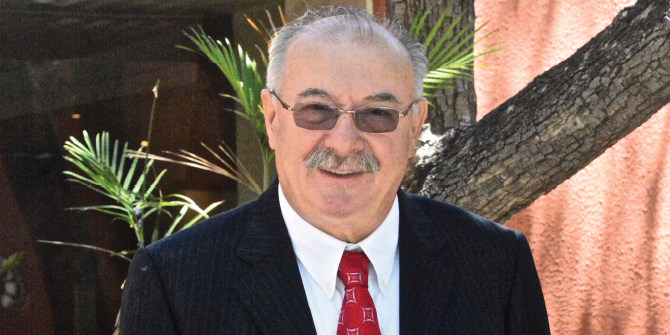
Radomir Bojanic
Sees Enormous Potential in Vibrant Tijuana
By Paulina Berkovich
Radomir Bojanic started working in the tourism industry by pure accident, but after spending the last 23 years working at the Palacio Azteca Hotel, he says it was the best thing that could have happened to him. For him, Tijuana is home, but he also sees a city with enormous potential for growth and development.
“Tijuana is a vibrant city that has emerged strengthened from each one of the problems or decays that it’s had the last 20 years. It has emerged strengthened because to each of the obstacles it has responded with new ideas and new products, like Baja Med cuisine, street food, new world-class restaurants, and some of them world-renowned. On the other hand, festivals of different kinds, expositions, theatrical works, new medical services and more,” Bojanic said.
Tourism already represents over 15% of the GDP in Baja California, but Bojanic encourages authorities to facilitate and promote the industry. Visitors and hosts alike benefit from the interaction that tourism brings.
“Outside of the economic focus, which is of the greatest importance for the internal production of many countries, tourism is the industry of education, of peace, and of personal improvement,” he explained. “By traveling one gets to know the people, the customs and manners of doing things that sometimes can serve you and in the same manner leave your mark in the place you visit.”
For Bojanic, one of the best features about Tijuana is its location, near the border and just 20 miles from downtown San Diego. Countless attractions lie within a five-hour radius. He listed the city of Ensenada, the valley of Guadalupe with all its wines, and further to the south, San Quintin, Bahia de los Angeles and Guerrero Negro as notable places to visit.
Las Vegas and Los Angeles lie in the opposite direction, offering amusement parks like Disneyland and Universal Studios. An enthusiastic skier, Bojanic also mentioned Big Bear Mountain, where he practices.
His activities are not limited to skiing, however. Bojanic loves walking through the desert and has crossed the peninsula on foot five times, walking from the Pacific side to the Gulf. It’s a journey he plans to repeat for as long as his feet allow him.
Sometimes, he goes on “short” walks of 20 or 30 kilometers in the area of Rosarito, Guadalupe Valley, or Ensenada. Hiking is just one of the activities Baja offers, with others including extreme sports, surfing, and fishing. For relaxation, Bojanic goes with his wife to the beaches south of San Felipe.
Bojanic was born in Sarajevo, Yugoslavia, now Bosnia and Herzegovina. After studying at the University of Economics and Administration, he changed jobs several times before entering the diplomatic service of Yugoslavia and stayed for 15 years until Yugoslavia’s civil war broke out, when he found himself in Mexico – the country he now considers his home.
For some time, he did not have a fixed job, but a friend introduced him to the family that owns the Palacio Azteca hotel. He has been working there ever since, spending the last 20 years as general manager.
“Now with full certainty I can say that this was the best thing that happened in my life, because I realized that I like the tourism industry more than diplomatic service,” Bojanic said. “I got married and established in this region. I found very good friends. I am here to stay until the end.”
Bojanic first learned to cook in a rustic manner, preparing food over an open fire. He still enjoys some of the culinary traditions of his country of birth, inviting friends for a meal of pork and lamb. But he has also embraced the full range of cuisine that Mexico has to offer, even including mezcal worms and grasshoppers. The local cuisine known as Baja Med, a fusion of Mexican and Mediterranean flavors, is top-quality experience he recommends to both locals and tourists.
He enjoys Mexican writers including Carlos Fuentes and Francisco Martin Moreno and a range of music from Mariachi bands to ballads, depending on what he is doing, and whether he is enjoying tequila or a local wine from the Valley. Although he doesn’t have anything against Northern bands, he said they are usually too loud for his taste.
All of his experiences have had a profound influence on him. Rather than choose a single person who has been the greatest influence on his life, Bojanic named his parents, various teachers and professors, friends from his time in the military service, and colleagues in the diplomatic service. He said each of them had something to teach him, and even the negative people he met along the way taught him to watch out for himself.
Describing what he likes best about Tijuana, Bojanic talked about the people who helped him feel at home from the very start: “The mix of people that one finds here is unique and it’s with reason that some call Tijuana a planet apart.”




